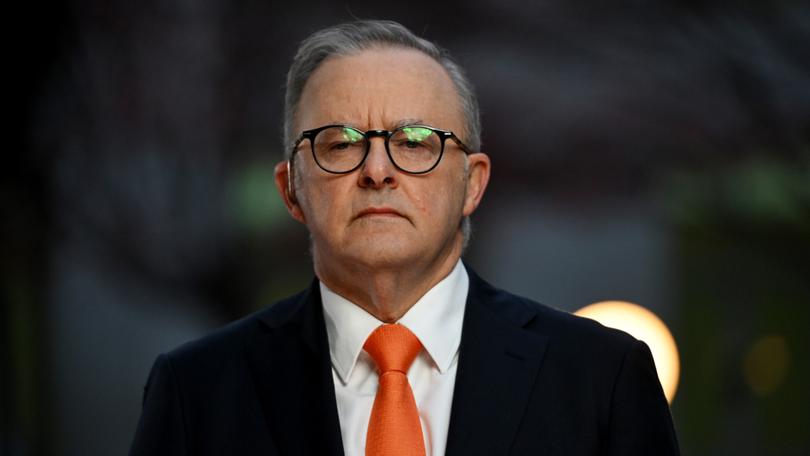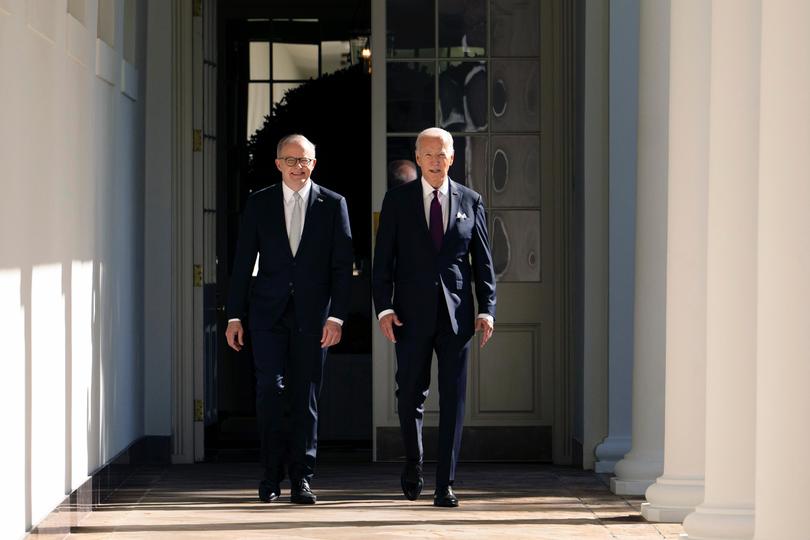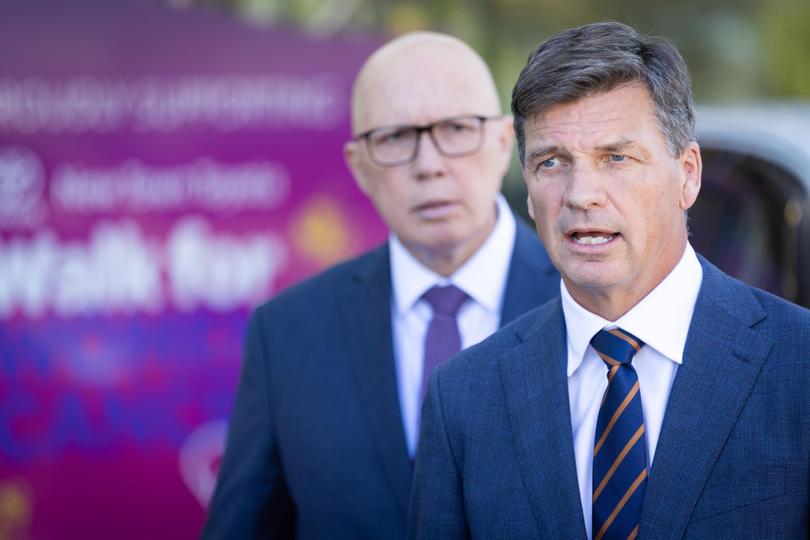The inside story on how the PM wrangled critical minerals subsidies for WA and the political fight ahead

A mix of mining heavyweights, Canberra and Washington bureaucrats and political insiders started trickling into the US Embassy just after 7.30pm on May 15.
The sprawling estate was hosting a private function to toast the one-year anniversary of a clean energy and critical minerals compact signed by Prime Minister Anthony Albanese and US President Joe Biden.
The mood inside the reception was buoyant.
Sign up to The Nightly's newsletters.
Get the first look at the digital newspaper, curated daily stories and breaking headlines delivered to your inbox.
By continuing you agree to our Terms and Privacy Policy.The timing could not have been more fortuitous.
Exactly 24 hours earlier, Treasurer Jim Chalmers handed down a Federal Budget featuring Australia’s largest ever down payment on the critical minerals industry.
The $13.7 billion in tax credits for critical minerals processing and green hydrogen production were at the centre of Anthony Albanese’s Future Made in Australia plan to create the local jobs and industries of tomorrow.
But the unprecedented investment had another purpose; to help Australia and its allies — including the US — insulate themselves from China’s domination of the global critical minerals supply chain.
The Americans were pleased. So too were the miners, and of course the Federal Ministers who fought for months internally to get it across the line.

But the tax breaks have quickly turned into a domestic political dispute after the Coalition branded the incentives “billions for billionaires”.
In a special report, The Nightly can reveal the inside story behind a policy that pitches Anthony Albanese and Peter Dutton’s different visions for the WA mining sector — and the country.
‘I would have never got anywhere’
Just a fortnight before Mr Albanese and Mr Biden signed the clean energy compact in Japan in May 2023, the Government was being pilloried for its lack of support for critical minerals.
Labor’s second budget allocated a paltry $80.5 million to the sector, prompting Mineral Resources boss Chris Ellison to warn jobs and investment would be lost overseas.
Hopes the long-awaited critical minerals strategy would include grants and subsidies to rival the US Inflation Reduction Act were dashed a month later, with $500 million in loans the only new announcement.
Hidden at the time was work already underway inside Government to redesign the tax system to turbocharge downstream processing.
In an exclusive interview with The West Australian, Resources Minister Madeleine King said releasing the strategy was a crucial first step in convincing her colleagues, and a cautious Canberra bureaucracy, to pursue the change.
“I couldn’t change or hope to change the taxation regime without having a strategy. I would have never got anywhere,” she said.
Ms King met with the Association of Mining and Exploration Companies in late July as the industry continued to lobby for federal support.
AMEC prepared a paper canvassing 12 options to incentivise downstream processing, including research and development tax offsets and other tax breaks, but none stood out.
The idea of tax breaks on production cost — a feature of Biden’s signature Inflation Reduction Act — emerged soon after as a potential solution worth investigating.
Convinced the Federal Government wouldn’t, or couldn’t, do the work itself, AMEC commissioned consultancy firm Mandala to model the costs and benefits of a 10 per cent tax production credit.
AMEC chief executive Warren Pearce flew to Canberra in late November armed with a report showing a production tax credit could inject $2.4 billion each year into the economy by 2035, supporting 4220 jobs.
Senior ministers briefed on the findings were interested but not willing to offer firm support.
In a far cry from the “billions for billionaires” rhetoric, Mr Dutton and shadow resources spokeswoman Susan McDonald were not immediately against the idea.
Shadow treasurer Angus Taylor, sources say, was opposed outright from the start.
A message from Washington
Labor’s attention through most of 2023 was consumed with the cost-of-living crisis and the Voice to Parliament referendum, which ended in crushing defeat for Mr Albanese.
The Prime Minister, drifting in the eyes of commentators and some of his own colleagues, was eyeing a reset as he jetted out to the US just days after the October 14 poll.
The State Dinner grabbed the headlines but it was talks on critical minerals with Mr Biden and Commerce Secretary Gina Raimondo that proved a precursor to the budget centrepiece.
At a roundtable with Mr Albanese and Ms King, the US commerce tsar laid bare the threat posed by China’s stranglehold on the critical minerals supply chain.
“We’ve allowed ourselves to become vulnerable by being overly dependent on one or two countries or companies around the world and as a result, extremely vulnerable to the harm that comes from these supply chain disruptions,” she said.
Mr Albanese announced a doubling of the $2 billion critical minerals loan scheme but strongly hinted there was more to come.
Value-adding to critical minerals was the “big next step that we need to do”, he told reporters.
Michael Sullivan, a counsellor for economic affairs at the US Embassy in Canberra, welcomed Australia’s push to help “strengthen” global supply chains in critical minerals.
“This is not an anti China policy . . . but I think we learned a lot through the pandemic about the vulnerabilities of supply chains that rely on just one country, or two choke points,” he told The West Australian.
Flip of the coin
Ms King admits that without the nickel crisis, the chances of the tax credits being included in the budget were “maybe 50-50”.
Over summer half a dozen nickel operations either scaled back or entered “care and maintenance” as the flood of cheap supply out of Indonesia — mined by Chinese state-owned companies — caused global prices to collapse.
News of the potential closure of BHP’s Nickel West brought national attention to the crisis, sharpening the minds of politicians capable of intervening.
“We had a real time example of how a market can be destroyed,” Ms King said.
The minister emerged from crisis talks with industry heavyweights in late January promising to “accelerate talks” with Treasury about production tax credits — the first public signal the option was under active consideration.
Mr Albanese arrived in Perth three weeks later promising to save the industry but left without an announcement.
The West understands there was tense debate around the cabinet table as ministers advocated different approaches.
Ms King doesn’t deny there were differences of opinion.
“It’s a big package and it should be challenged. And it was challenged,” Ms King said.
For his part, Mr Albanese was keen on something substantial — an investment that would send a clear signal to industry and large investors about the Federal Government’s ambition to transition the economy.
A big shift
Mr Pearce travelled to Canberra again in late February to push the case, this time with a delegation of miners and the chair of EV giant Tesla, Robyn Denholm.
The groups held talks with top Treasury and Australian Tax Office officials and senior staffers from four ministerial office, including the Prime Minister’s.
Mr Pearce detected a clear shift from officials and political staffers: it was no longer about the what, but the how.
In the following weeks Treasury requested detailed data from mining companies in a sign the policy work was at the pointy end.
Other mining groups — including the Chamber of Minerals and Energy WA — also lobbied senior ministers in private meetings.
When Mr Albanese unveiled his plans for a Future Made in Australia Act in mid-April, industry leaders could see the pieces of the puzzle falling into place.
The detail was revealed on budget night.
A total of $31.9 billion of tax credits — including $13.7b over the next decade — for critical mineral minerals processing and refining and green hydrogen production, starting from 2027-28 and running until 2041.
The inclusion of tax breaks for green hydrogen was a surprise to many but had been in the works for months as the Federal Government looked to the build on the $2b Hydrogen Headstart program unveiled in last year’s budget.
‘Billions for billionaires’
The attacks started within a few hours of the budget’s release.
“This is crazy stuff,” shadow treasurer Angus Taylor told Nine Radio, adding there was “no way” the Coalition would support $13.7 billion in tax breaks for “billionaires”.
The criticism continued throughout the week, culminating in Mr Dutton promising in his Budget reply speech to abandon the “corporate welfare”.
Miners were perplexed at the Coalition’s position, given the political importance of WA, and angered by the language, particularly the description of tax credits as “handouts” to “billionaires”.
The position split the party as WA Liberal leader Libby Mettam and O’Connor MP Rick Wilson — whose electorate covers the heart of the State’s nickel sector — expressed support for Labor’s plan.

Most Coalition MPs supported the position but some were aghast at the strength of Mr Taylor and Mr Dutton’s rhetoric.
One Liberal MP said the language showed a tin ear to WA and would leave the party exposed to claims it was “anti-WA” — a charge Ms King and Premier Roger Cook quickly laid.
Mr Dutton wasn’t retreating from his position when he landed in Perth late last month.
But the Liberal leader did tone down the language and avoided any unprompted billionaire bashing, choosing instead to focus on his alternative plan to unleash the potential of WA’s mining sector.
He wants to slash project approval times and unwind Labor’s industrial relations agenda.
He wants to take the industry back to the future.
Mr Albanese sees another path — for WA and for the country.
